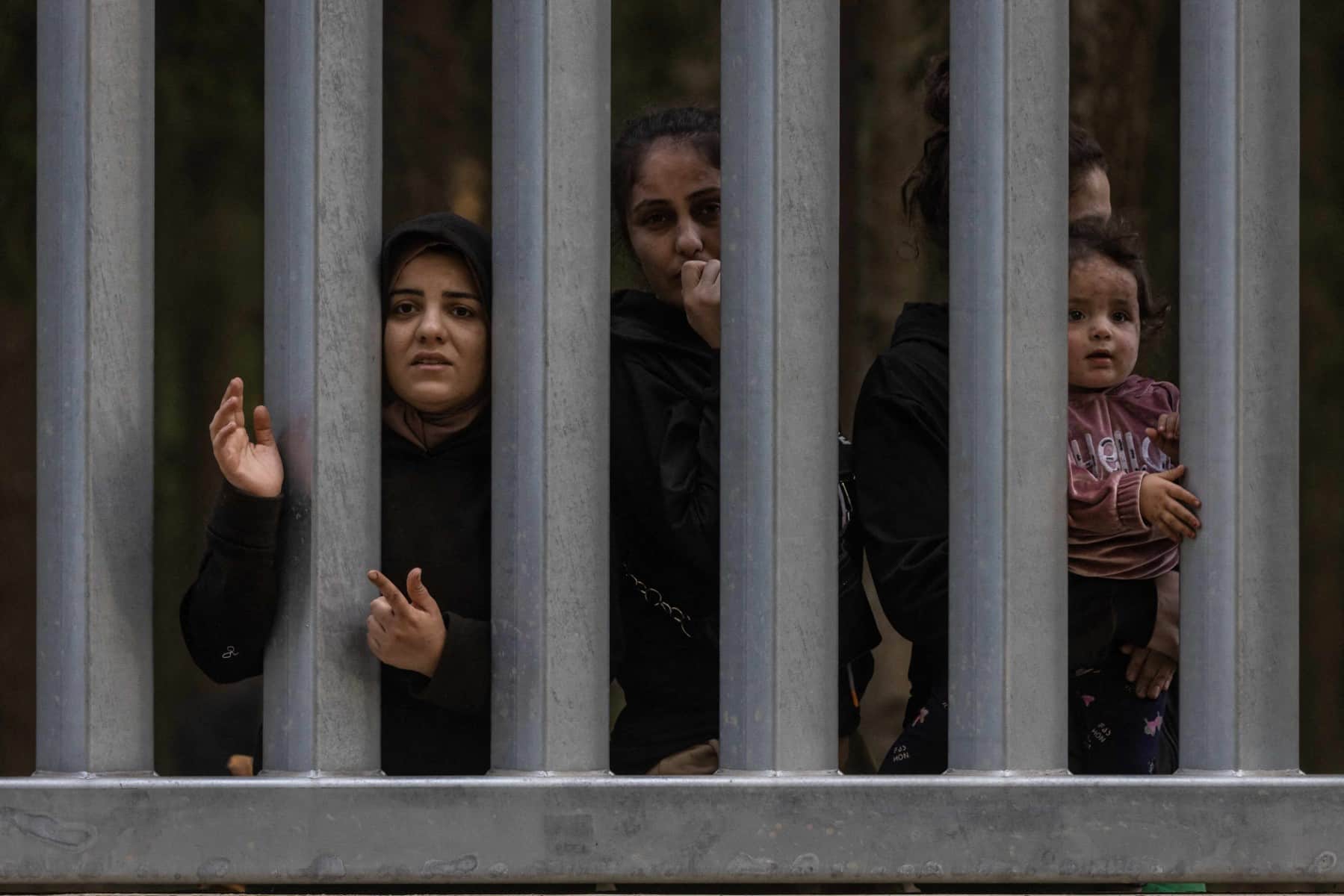
Migrant families from Syria and Iraq are seen behind the border wall at Polish-Belarus border not far from Bialowieza, eastern Poland, on May 29, 2023. FILE PHOTO/Agence France-Presse
KARBALA, Iraq — Rami, a Syrian worker in Iraq, spends his 16-hour shifts at a restaurant fearing arrest as authorities crack down on undocumented migrants in the country better known for its own exodus.
He is one of hundreds of thousands of foreigners working without permits in Iraq, which after emerging from decades of conflict has become an unexpected destination for many seeking opportunities.
Article continues after this advertisement“I’ve been able to avoid the security forces and checkpoints,” said the 27-year-old, who has lived in Iraq for seven years and asked that AFP use a pseudonym to protect his identity.
FEATURED STORIES GLOBALNATION South Korea scrambles jets as Chinese, Russian warplanes approach GLOBALNATION Singapore hangs 4th person in three weeks GLOBALNATION Starbucks coffee and a glimpse of a North Korean mountain villageREAD: 7 Pinoys bound for Iraq intercepted at Naia
Between 10 in the morning and 2:00 am the next day, he toils at a shawarma shop in the holy city of Karbala, where millions of Shiite pilgrims congregate every year.
Article continues after this advertisement“My greatest fear is to be expelled back to Syria where I’d have to do military service,” he said.
Article continues after this advertisementThe labour ministry says the influx is mainly from Syria, Pakistan and Bangladesh, also citing 40,000 registered immigrant workers.
Article continues after this advertisementNow the authorities are trying to regulate the number of foreign workers, as the country seeks to diversify from the currently dominant hydrocarbons sector.
Many like Rami work in the service industry in Iraq.
Article continues after this advertisementREAD: In Iraq Kurdish town, many undertake smuggling route to Europe via Belarus
One Baghdad restaurant owner admitted to AFP that he has to play cat and mouse with the authorities during inspections, asking some employees to make themselves scarce.
Not all those who work for him are registered, he said, because of the costly fees involved.
Threat of legal actionSome of the undocumented workers in Iraq first came as pilgrims. In July, Labour Minister Ahmed al-Assadi said his services were investigating information that “50,000 Pakistani visitors” stayed on “to work illegally”.
Despite threats of expulsion because of the scale of issue, the authorities at the end of November launched a scheme for “Syrian, Bangladeshi and Pakistani workers” to regularize their employment by applying online before December 25.
The ministry says it will take legal action against anyone who brings in or employs undocumented foreign workers.
READ: Iraqi immigrants fear for loved ones back home
Rami has decided to play safe, even though “I really want” to acquire legal employment status.
“But I’m afraid,” he said. “I’m waiting to see what my friends do, and then I’ll do the same.”
Current Iraqi law caps the number of foreign workers a company can employ at 50 percent, but the authorities now want to lower this to 30 percent.
“Today we allow in only qualified workers for jobs requiring skills” that are not currently available, labor ministry spokesman Nijm al-Aqabi told AFP.
It’s a sensitive issue — for the past two decades, even the powerful oil sector has been dominated by a foreign workforce. But now the authorities are seeking to favor Iraqis.
“There are large companies contracted to the government” which have been asked to limit “foreign worker numbers to 30 percent”, said Aqabi.
“This is in the interests of the domestic labour market,” he said, as 1.6 million Iraqis are unemployed.
He recognised that each household has the right to employ a foreign domestic worker, claiming this was work Iraqis did not want to do.
‘Life is hard here’One agency launched in 2021 that brings in domestic workers from Niger, Ghana and Ethiopia confirms the high demand.
“Before we used to bring in 40 women, but now it’s around 100” a year, said an employee at the agency, speaking to AFP on condition of anonymity.
It was a trend picked up from rich countries in the Gulf, the employee said.
“The situation in Iraq is getting better, and with salaries now higher, Iraqi home owners are looking for comfort.”
A domestic worker earns about $230 a month, but the authorities have quintupled the registration fee, with a work permit now costing more than $800.
In the summer, Human Rights Watch denounced what it called a campaign of arbitrary arrests and expulsions targeting Syrians, even those with the necessary paperwork.
HRW said that both homes and work places had been targeted by raids.
Ahmed — another pseudonym — is a 31-year-old Syrian who has been undocumented in Iraq for the past year and a half.
He began as a cook in Baghdad and later moved to Karbala.
“Life is hard here — we don’t have any rights,” he told AFP. “We come in illegally, and the security forces are after us.”
His wife did not accompany him. She stayed in Syria.
Subscribe to our daily newsletter
“I’d go back if I couldscatter365,” said Ahmed. “But life there is very difficult. There’s no work.”
READ NEXT New Zealand Navy vessel hit reef, sank after ‘autopilot&... Saudi Arabia hosts UN talks on drought, desertification EDITORS' PICK Marcos says he ordered impeachment moves vs VP Sara Duterte stopped VP Sara Duterte no-show at NBI, asks for rescheduling EXPLAINER: What is a nuisance candidate? Manila Water to customers: Include septic tank desludging in holiday checklist VP Sara Duterte amid political heat: ‘We will not break’ Harry Roque skips DOJ probe into qualified human trafficking issue MOST READ Comelec junks plea of 18 nuisance bets, one of them to seek SC's help South Korea scrambles jets as Chinese, Russian warplanes approach BIZ BUZZ: Power couple’s Polo Club bid foiled Taguba says he never changed tune on Paolo Duterte Follow @FMangosingINQ on Twitter --> View comments
